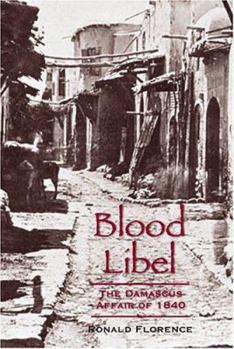Blood Libel: The Damascus Affair of 1840
Select Format
Select Condition 
Book Overview
In Damascus in February 1840, a Capuchin monk and his servant disappear without a trace. By the end of the day, rumors point at the local Jewish community, a tiny minority in the city. Within weeks, the rumors turn to accusations of ritual murder--the infamous "blood libel." Torture, coerced confessions, manufactured evidence, and the fury of the crowds are enough to convict the accused Jews. By the time the rest of the world learns of the events...
Format:Hardcover
Language:English
ISBN:0299202801
ISBN13:9780299202804
Release Date:October 2004
Publisher:University of Wisconsin Press
Length:257 Pages
Weight:1.16 lbs.
Dimensions:0.9" x 6.0" x 9.0"
Customer Reviews
3 ratings
The deadly consequences of believing the Blood Libel
Published by Thriftbooks.com User , 18 years ago
On Thursday, February 6, 1840, Capuchin Father Thomas and his servant were reported missing to the French consulate in Damascus, Syria. Immediate rumor was that Father Thomas was last seen in the Jewish quarter. Crowds chanted "The Jews sacrificed the Father." Within two days, the Chief of Police and a detachment of soldiers and police informed the Jews they were under suspicion, searched and ransacked the Jewish quarter, and dug-up graves. A Muslim prisoner, Sa'id-Muhammad-al-Talli was released on condition he help the authorities find the missing monk. The next day, al-Talli, with soldiers and police, arrested four Jews. Sherif Pasha, Governor of Syria, and adopted son of Muhammad Ali, Viceroy of Egypt, summoned the chief Rabbi, telling him "It is obvious to me that you killed him [Father Thomas] to take his blood and that's your custom." To the contrary, a Jewish witness, Isaac Yavo, claimed he saw the Father and his servant exit the city at the same time he was alleged to have disappeared in the Jewish section. The French consul Ratti-Menton took special interest in the case because Father Thomas was a French protégé. When Jewish leaders came to the Consulate to negotiate, Ratti-Menton decided to interrogate one of the delegates, Solomon al-Hollag. After three days without a "confession," Ratti-Menton turned al-Hollag over to local authorities "who undoubtedly can employ more numerous and decisive methods of investigation than any foreign agent." After being tortured, al-Hollag "confessed" he saw the Father killed and his blood collected, at the house of David Harari. More arrests were made. Isaac Yavo, the witness who saw the monk leave the city, was next interrogated. When he didn't confess after three days, he was flogged until he did. He also named those who "suborned" his previous testimony. Two days later, he died from torture. Sherif Pasha arrested 65 boys at a Hebrew school - one of whom "confessed" his father took part in the monk's murder - and arrested another 70 Jewish men. The cycle of arrests, torture, "confession," and naming co-conspirators, continued. With the French consul believing Jews take "human blood to mix with the flour for the Passover dough," Christians took to the streets for Father Thomas' funeral (sans body), carrying a tombstone inscribed "... assassinated by the Jews the 5th of February of the year 1840." (The Arabic translation of the tombstone, which still stands at the Franciscan church in Damascus, reads "Jews slaughtered him on the fifth of Isb?t.") French consul Ratti-Menton promoted an interpretation of Jewish response to torture that allowed if they confessed, they were guilty of murder, but if they did not confess, they were guilty of keeping the "secret" of blood sacrifice - a practice so secret most Jews were not even aware of it! An example of the torture used to extract confessions and name co-conspirators is the ordeal of Rabbi Moses Salonicli: He was repeatedly whipped on the sol
Deadly strains of the anti-semitic virus
Published by Thriftbooks.com User , 19 years ago
This remarkable short history of the Damascus affair of 1840 is an eye-opening snapshot of the dynamics of archaic anti-semitism resurfacing unexpectedly in the world of the moribund Ottoman empire.Despite its Middle Eastern context, it is almost as much about Europe and the story is really of the spread of a European strain of anti-semitism to a susceptible environment. The publication, then republication, for example, of a toxic 'blood libel' tract in the early nineteenth century, is one of the factors in the outbreak in the closed, almost archaic world of Jews, Christians and Moslems in old Damascus. The story is told well, and crisply covers all the majors incidents, and the tale is an important incident in the emergence of the anti-semitism of the later nineteenth century.
extremely interesting.
Published by Thriftbooks.com User , 19 years ago
i loved this book. its non-fiction, bUt i still read it in one shot. i recommend this book to anybody interested in jewish history. I liked the way the author described the fighting going on between Cremeiux and Montefiore. Two altruistic people who went out of their way to help out Jews worlds apart. They did it for the love of their nation. it still doesnt take the fact away that each one wanted the credit. But they do deserve it. Its very sad that after all that Cremieux did for his nation, his wife had his kids converted to Christianity. [email protected]






